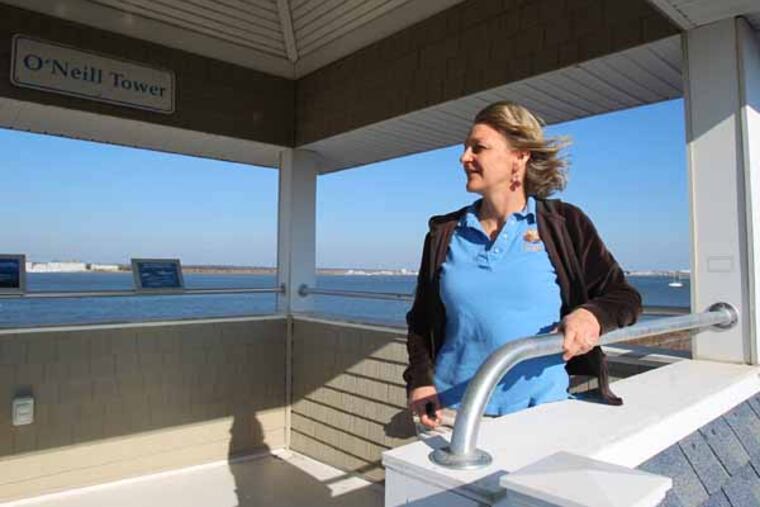New Jersey Audubon Society is cutting back at several facilities
CAPE MAY - The New Jersey Audubon Society, which for 115 years has exhorted nature-seekers to interact with the physical world, is expanding its virtual horizons in a budgetary move officials say is born of Darwinian necessity.

CAPE MAY - The New Jersey Audubon Society, which for 115 years has exhorted nature-seekers to interact with the physical world, is expanding its virtual horizons in a budgetary move officials say is born of Darwinian necessity.
"To survive, we need to adapt," said Eric Stiles, president of the nonprofit nature and conservation group, which has no connection with the National Audubon Society.
Effective Jan. 1, the organization will close two facilities - including the 135-acre Rancocas Nature Center in Mount Holly - and modify programming at nine others.
Audubon members and others will be able to connect with the society on an expanded Internet site and through social media. Some school trips to facilities such as the Rancocas center; Weis Ecology Center in Ringwood, Passaic County, also slated to close; and the Nature Center of Cape May will be replaced by Internet learning opportunities with staff, Audubon officials said.
"It doesn't make sense to keep the lights on for the two people a day who may wander in during the winter months," Stiles said. Except for a birdseed sale to take place Jan. 5 and 6, the Cape May facility will be closed to the public from Jan. 1 through April 15.
"We need to use our resources more wisely so that we can continue to perpetuate our mission," he said. "We're not reducing programming but reducing costs."
A children's fishing camp, family kayak tours, and other summer programs at the Nature Center will not be affected.
Guided hikes, tours, lectures, and special events at the world-famous Cape May Bird Observatory and some other sites will remain at the same level or expand, Stiles said. But the gift shops at the observatory's main location, in the Goshen section of Middle Township, and near Lake Lily in Cape May Point will have limited off-season hours.
Despite the economic downturn of the last five years, membership and private and corporate funding for the state organization have remained strong, Stiles said. So has camp enrollment at its facilities.
But fewer public and private schools are taking field trips. Attendance by school groups at the nature centers dwindled to almost nothing this year, Stiles said.
Staff-led programs at the various centers start at $50 per classroom and range upward depending on the activity and number of students.
Evolving
"The model for our programming needs to continue to evolve," Stiles said.
The society is studying a curriculum called ECO Classroom, created through a collaboration between Conservation International, a nonprofit national wildlife group, and the Northrop Grumman Corp., a global security company. The program is used by schools and cultivates "the next generation of environmental stewards" through video and Internet experiences that focus on ecology, biology, and environmental studies, he said.
School groups could augment a similar curriculum used by Audubon with hands-on programs at the 20-year-old Nature Center, he said.
Sanctuary director Gretchen Whitman said she was optimistic about the changes on a chilly morning last week, as she stood on the observation deck at the 20-year-old Nature Center. She scanned the harbor for a lone western grebe recently spotted bobbing among the buoys and channel markers. Perhaps the bird's rare out-of-season appearance was a harbinger of good things.
'Refine and hone'
Revenue from school groups had accounted for 10 percent of the Nature Center's budget, Whitman said. This year, that dwindled to 4 percent.
But "we're still open for business," she said. "It's just a different business model that we'll be following that is more in line with the seasonal nature of other businesses in Cape May."
It "gives us more time to refine and hone our programming for 2013," Whitman said.
She said she would continue working with the center's 80 volunteers to plan spring, summer, and fall programs and begin a "green" renovation of a classroom building on the property.
Birders are grateful that the observatory will remain largely untouched.
"I'm glad to hear that essentially nothing is changing right now as far as programing. . . . This is my favorite time of the year," said Liz Stevens, 63, a retired teacher who frequently travels there from Warminster, Bucks County, in the winter.
"If Audubon needs to change up what it's doing to stay relevant and operational, then I think it's a good idea," she said.
But any scaling back at the observatory or Nature Center is a concern to supporters of Cape May County's $500 million-a-year ecotourism industry.
"To have a place like the Nature Center of Cape May available year-round is part of a quality of life unique to Cape May County. . . . It adds to the diversity of the area," said Diane F. Wieland, director of the county tourism department.
"Any time a program is cut back, there is concern about how it will impact the rest of the equation," she said.
The lower cape of New Jersey is considered the continent's premier flyway for migrating birds because of a unique funneling effect resulting from its locale midway between the North Pole and South America, Wieland said.
'Phenomenal'
And there is no bad time of the year for birding in Cape May, said Pete Dunne, director of communications for the New Jersey Audubon Society.
"The birding down here is phenomenal," Dunne said. A count this month identified 168 distinct species, he noted.
"As an organization, we would be shooting ourselves in the foot if we eliminated meaningful programming. Instead, we're really looking at ways to connect more people with nature . . . whether literally or virtually."